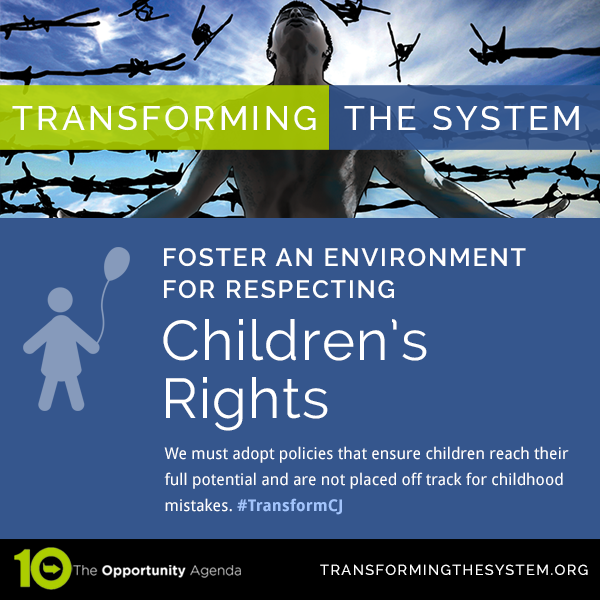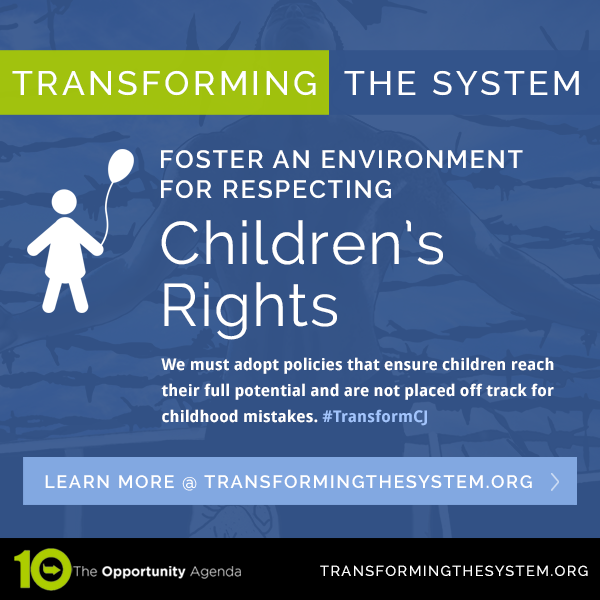Foster an Environment for Respecting Children’s Rights
Children are still developing and may make mistakes as they are growing toward adulthood. There is considerable research that shows that adolescents’ decision-making skills are at a much lower capacity as compared to those of adults. Children and adolescents should not be treated like adults because they do not have the same mental capacity of adults. Despite this, some courts and prosecutors routinely administer adult-like consequences to children by issuing harsh sentences and requiring incarceration for childhood behaviors. We must adopt policies that ensure that children reach their full potential and are not placed off track for childhood mistakes.
Sadly, these adult-like penalties have even entered our schools. Schools should be institutions of learning and safe spaces for children. Instead, they are too often spaces in which children may be funneled into the criminal justice system. Children of color have suffered the most from this approach, with wide racial disparities in how children are suspended, expelled, and referred to the criminal justice system.
It benefits all of us to rehabilitate young people who engage in crimes. They have a special capacity to change, and we’re all better off if we provide them this opportunity, and find ways to help them rejoin and contribute to society. However, young people are often treated like adults within the criminal justice system and subject to harsh school disciplinary school practices when they are in their communities. Legislatures should ensure that the criminal justice system allows young people who commit crimes are given a second chance and that schools foster positive relationships.
Solutions & Actions to Foster an Environment for Respecting Children’s Rights
1) Abolish Life Without Parole
Legislatures should abolish life without parole for offenses committed before the individual was 18 years of age and reward system actors that adopt policies that ensure that young people do not languish imprisoned as the system struggles to meet the requirements of the law. Judges, judicial bodies and organizations, and prisons should take an active role in ensuring young people who have been sentenced to life without parole have their sentences reviewed.
2) Raise the Age of Criminal Responsibility
Legislatures should raise the age of criminal responsibility in adult court to at least 18 years of age in every jurisdiction in the country, including instituting a minimum age for processing in adult criminal court where none exists.
3) Expand Young Adult Protections
Legislatures should progressively raise the age of juvenile court jurisdiction to at least 21 years old with additional, gradually diminishing protections for young adults up to age 25, such as allowing young age to be a mitigating factor when considering an individual’s sentence.
4) Exempt Minors from Sex-Related Registries
Congress and state legislatures should exempt young people from registries, community notification, and residency restrictions for sex-related conduct.
5) Invest in Community-Based Programs
Legislatures should expand flexibility in funding, so that local jurisdictions may spend funds on community-based programs, including mediation, mentoring, and vocational programs, rather than on large, costly youth lock-ups.
6) Get Rid of Ineffective Programs
Congress and the Department of Justice (DOJ) should de-incentivize ineffective programs, such as “Scared Straight” and boot camps, and eliminate the automatic transfer of young people into adult courts. Programs should comply with best practices for treatment of young people.
7) Create Inclusive Mental Health Services for Young People
Legislatures should require mental health services that are sensitive to various genders and gender expressions and sexualities, fund services for LGBTQ youth and youth who have left their homes, and/or experience family rejection.
8) Eliminate “Zero Tolerance” Policies in Schools
Local governments and school administrations should eliminate "zero tolerance" policies, which mandate often severe and punitive, predetermined consequences that are applied regardless of the gravity of behavior, mitigating circumstances, or situational context; and decriminalize truancy.
9) Implement Restorative Justice in Schools
Local government and school administrations should mandate the repeal of overly punitive school discipline policies that push schoolchildren into the criminal justice system; and instead adopt comprehensive restorative justice programs to create safer, healthier, and more equitable places for children to learn. These practices may include peer mediation, daily wrap sessions, and the elimination of mandatory suspensions and/or expulsions for specified conduct.
10) De-fund Police Officers in Schools
The Department of Justice should eliminate the funding of police officers in schools and invest in school-wide restorative justice program to improve school safety.
Solutions in Action
We’ve identified programs and initiatives that incorporate some of these solutions. They may provide inspiration, albeit at times imperfect, for others who are interested in instituting some of these policies.
- The Oakland Unified School District has a well-regarded manual for implementing school-wide restorative justice programs.
Flashcards
Below are flashcards for you to use the next time you have a media interview, need to write an opinion piece, or just need some ideas as you think through your messaging strategy.
Ending Life Without Parole for Young People
value
It benefits all of us to rehabilitate young people who engage in serious crimes. Young people have a special capacity to change, and we’re all better off if we provide them this opportunity, and to find ways to help them rejoin and contribute to society.
problem
Right now our system of justice does not give many young people who engage in serious crimes the opportunity for a second chance. Instead, young people who engage in serious crimes are being sentenced to life without parole, which means that they will spend the next 40, 50, or 60 years in prison with no chance of release. Life without parole for young people is life without the opportunity for rehabilitation, and that is wrong.
solution
When young people commit serious crimes, they should be held accountable but in a way that reflects their capacity for rehabilitation. Young people are still developing mentally and emotionally. Their punishment needs to be focused on rehabilitation and reintegration into society, giving young people the opportunity to change and grow. We can do better by providing sentencing alternatives that are in the best interest of the both young person and of society. Therefore, legislatures should abolish life without parole for offenses committed before the individual was 18 years of age.
action
Educate your elected officials about alternatives to denying youth the opportunity for rehabilitation and the need to eliminate this sentence.
For more information on respecting the rights of children in the criminal justice system, check out:
- The Justice Policy Institute (JPI), a think tank dedicated to reducing society’s reliance on incarceration with a particular focus on reforming the juvenile justice system;
- Equal Justice Initiative (EJI), which provides legal representation to indigent defendants and incarcerated individuals denied fair treatment by the criminal justice system with a focus area on ensuring the rights of children involved in the justice system;
- Raise the Age NY, a campaign designed to increase public awareness of the need to implement a “comprehensive approach to raise the age of criminal responsibility in NYS so that the legal process responds to all children as children;”
- Vincent Shiraldi, Bruce Western and Kendra Bradner, who advocate for appropriate, community-based responses to justice-involved young adults in their 2015 report, Community-Based Responses to Justice-Involved Young Adults;
- Our 2014 Communications Institute Fellow Nicole Pittman of Impact Justice, who discusses the harms of placing children in sex offender registries in her 2013 report, Raised on the Registry: The Irreparable Harm of Placing Children on Sex Offender Registries in the US;
- Dignity in Schools Campaign (DSC), which “challenges the systemic problem of pushout in our nation's schools and works to dismantle the school-to-prison pipeline” through advocacy, organizing, and leadership development; and
- Restorative Justice Training Institute, which provides training and resources to schools and youth-focused organizations.




